Namaste, you have heard correctly! The PM Surya Ghar Yojana is a program designed to offer 300 units of complimentary electricity per month to illuminate one crore houses.
This nationwide plan began accepting applications in February 2024. If you desire free electricity under this Yojana, read about it.
PM Surya Ghar Yojana: A Comprehensive Overview
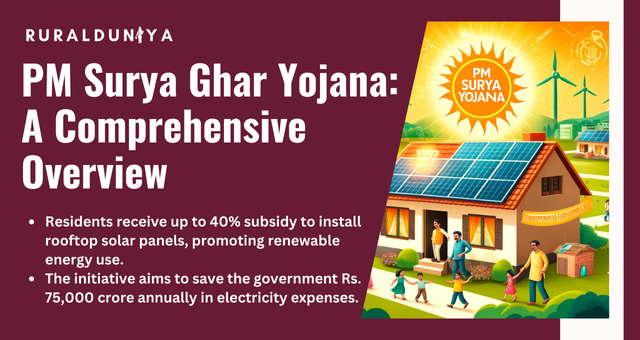
The PM Surya Ghar Yojana is a governmental initiative designed to offer complimentary power to residences in India. The initiative was inaugurated by Prime Minister Narendra Modi on February 15, 2024.
As part of the program, residents will receive a financial assistance to install solar panels on the rooftops of their homes. The subsidy would reimburse a maximum of 40% of the expenses incurred for the purchase of the solar panels.
The program is anticipated to serve 10 million households in India. The initiative is projected to result in an annual savings of Rs. 75,000 crore for the government in electricity expenses.
The aim of this project is to reduce reliance on conventional energy sources by implementing rooftop solar panels in residential buildings and transitioning towards sustainable energy practices.
It advocates for the use of environmentally-friendly and renewable energy sources.
PM Surya Ghar Objectives
The primary goals of the initiative are:
- To accomplish the installation of one crore rooftop solar systems (RTS) in the residential sector.
- To facilitate the provision of complimentary or affordable power to one crore families, with a monthly consumption limit of 300 units, through the use of rooftop solar panels.
- The goal is to generate 1,000 billion units of renewable power using the installed capacity of the program.
- This will lead to a reduction of 720 million tons of CO2eq emissions over the 25-year lifespan of the rooftop solar systems.
- To establish the necessary infrastructure and support system for rooftop solar projects, which includes regulatory assistance and so on within the country.
- To stimulate the local economy and promote job creation, while also improving energy security.
PM Surya Ghar Benefits
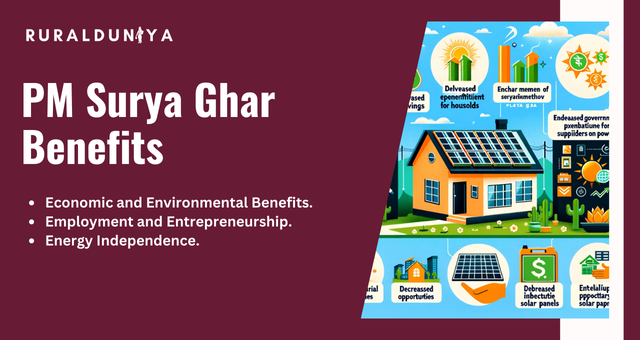
The advantages of the scheme encompass –
- The provision of complimentary electricity to households.
- Decreased government expenditure on power.
- Enhanced utilization of sustainable energy sources.
- Decreased carbon emissions.
- There are numerous entrepreneurial opportunities available for suppliers who specialize in the supply and installation of solar panels.
- Job prospects for young individuals possessing technical expertise in the installation, production, and upkeep of solar panels.
PM Surya Ghar Cost
| Average Monthly Electricity Consumption (units) | Suitable Rooftop Solar Plant Capacity | Subsidy Support |
| 0-150 | 1-2 kW | ₹ 30,000/- to ₹ 60,000/- |
| 150-300 | 2-3 kW | ₹ 60,000/- to ₹ 78,000/- |
| > 300 | Above 3 kW | ₹ 78,000/- |
PM Surya Ghar Eligibility
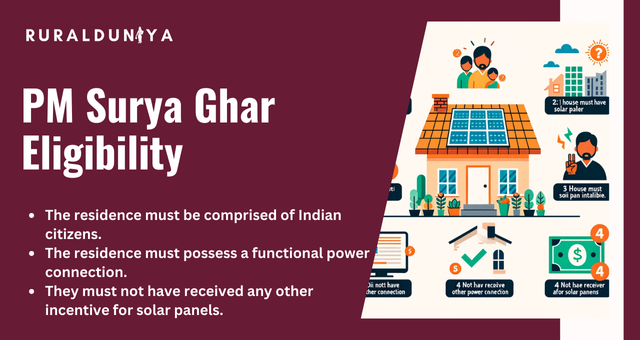
Eligibility criteria are given below.
- The residence must be comprised of Indian citizens.
- The residence must possess a dwelling with a roof that is appropriate for the installation of solar panels.
- The residence must possess a functional power connection.
- They must not have received any other incentive for solar panels.
PM Surya Ghar Yojana Online Apply
Steps to Apply Online for the Yojana –
Step 1: Go to the official website.
Step 2: Please provide the following information for registration.
Step 3: Authenticate by entering your Consumer Number and Mobile Number.
Step 4: Submit an application for the installation of rooftop solar panels in accordance with the provided form.
Step 5: Complete the online application form.
Step 6: Await the approval of feasibility from the DISCOM for installation.
Step 7: After the installation is complete, provide the necessary information about the plant and proceed to apply for a net meter.
Step 8: Once the net meter is installed and inspected by the DISCOM, they will generate a commissioning certificate through the portal.
Step 9: After receiving the commissioning report. Provide the bank account information and a voided check via the site.
Your subsidy will be deposited into your bank account within a period of 30 days.
PM Surya Ghar Documents Required
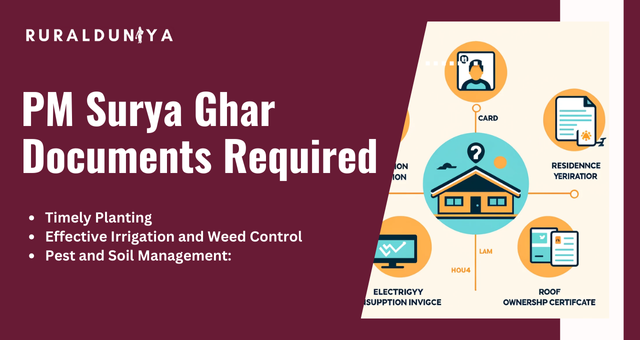
Documents required are –
- Verification of one’s identification.
- Verification of residence.
- Invoice for electricity consumption.
- Certificate of ownership for the roof.
PM Surya Ghar Yojana Last Date
There isn’t a deadline for it. That being said, in order to make sure you don’t miss any important announcements or deadlines, you must keep up with official updates.
PM Surya Ghar Helpline Number
To address any inquiries regarding the rooftop solar program, you may contact the toll-free number 15555.
Rundown
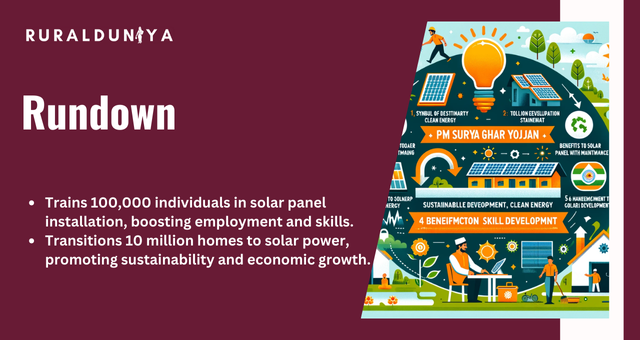
The PM Surya Ghar Yojana is a symbol of sustainable development, bringing forth a new era of clean energy and promoting significant job creation and skill development.
The government facilitates economic empowerment and advances towards a greener, more resilient future by providing training to 100,000 individuals in solar panel installation and maintenance.
This effort not only provides advantages to 10 million homes as they transition to solar energy, but also invigorates the nation’s workforce, in line with broader objectives of environmental conservation and equitable economic expansion.
FAQs
How can I get free solar panels from the government in India?
The Indian government doesn’t offer free solar panel installation. Still, the government launched Muft Bijli Yojana.
When was PM Surya Ghar Yojana announced?
This Yojana was introduced by Narendra Modi on 22 January 2024.
When will the applications for PM Surya Ghar Yojana start?
This Yojana online applications began on February 13, 2024.
What types of roofs are suitable for Rooftop solar (RTS) system?
Any load-bearing roof can support rooftop solar PV installations.

Nishank is a social impact enthusiast with a solid foundation in public policy, micro-enterprise, and agribusiness. Growing up in a farmer’s family has given him a profound connection to rural communities, fueling his passion to empower people towards self-reliance. He completed his undergraduate studies at the Delhi University and earned a master’s degree in Rural Management from National Institute of Rural Development & Panchayati Raj in Hyderabad.



